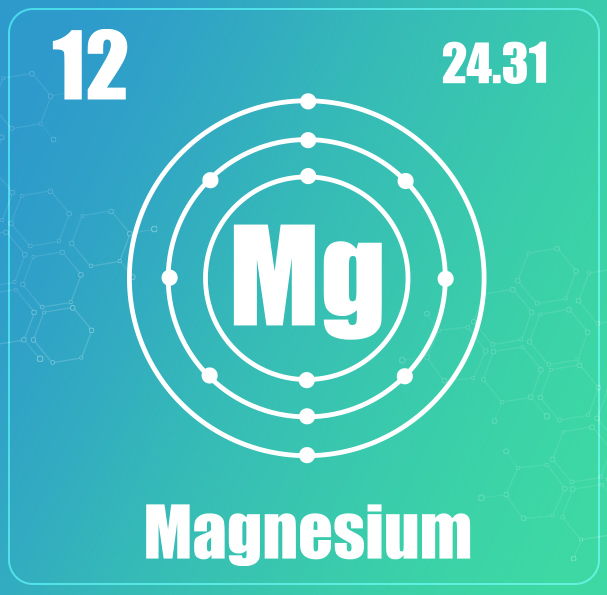Different forms of magnesium have varying levels of bioavailability and may be more effective for different purposes. Fully reacted magnesium is a term used to describe magnesium supplements that are formulated to enhance the bioavailability and absorption of magnesium by the body. These supplements typically use chelated forms of magnesium, which means that the magnesium is bound to another molecule to improve its stability and absorption. A fully reacted mineral will only have 1-2 potency ranges standard. All other potencies are manufactured by including unreacted free floating mineral content, which could likely cause stomach upset. Fully reacted minerals will always be the most bioavailable form. Fully reacted magnesium supplements may offer advantages over other forms of magnesium by improving absorption and targeting specific health concerns. This blog explores the different forms of magnesium and their respective uses.
Reactive Magnesium Forms:
Magnesium citrate: This form of magnesium is one of the most bioavailable forms. It has a laxative effect and is most commonly used to treat constipation. It has similar effect as taking a saline laxative.
Magnesium glycinate: This form of magnesium is bound to the amino acid glycine, which enhances its absorption by the body. It occurs in protein rich foods such as meat, dairy and legumes. It is used in a wide variety of health conditions such as support for inflammation and bone health; facilitates a normal heart rhythm, improving athletic performance; managing blood sugar and muscle cramping. It’s often used to promote relaxation and improve sleep.
Magnesium l-threonate: This is a novel form of magnesium that has been clinically shown to improve cognitive function and brain health. It is more easily absorbed by the brain than other forms of magnesium. New clinical indications support mood, sleep and mental health. It is patent protected and branded under the name Magtein®.
Magnesium taurate: This form of magnesium is bound to the amino acid taurine, which may help to support cardiovascular health. Taurine has been shown to help regulate heart rhythm and blood pressure, and may also have antioxidant and anti-inflammatory effects. Magnesium and taurine both work to lower elevated blood pressure, slow down the progress of cholesterol-induced atherogenesis, prevent heart arrhythmias as well as stabilize platelets. Magnesium taurate has a role in regulating blood sugar.
Magnesium orotate: This form of magnesium is bound to orotic acid, a substance found naturally in our DNA and plays a role in energy metabolism. It is used to promote heart health due to Orotic Acid’s unique role in energy production and heart blood vessel tissue. It has been shown to improve outcomes in people with congestive heart failure. It also help increase athletic performance, used to treat heartburn and acid reflux and shown to support a healthy gut.
Magnesium malate: This form of magnesium is bound to malic acid, a substance found in many fruits and wine and has a sour taste. It is often used as a food additive to enhance flavor and acidity. This form may have a gentle laxative effect but is easier on the gut than Mg Citrate. Malic acid may help to support energy production and reduce muscle pain and fatigue. It is regularly used to treat chronic fatigue or fibromyalgia as blood magnesium tends to be low in these patients.
Magnesium lactate: This form of magnesium is bound to lactic acid, a substance that is produced by our muscles and blood cells especially during exercise. It is easily absorbed by the body and gentle on the gut and often used to treat people who need high doses of Mg or don’t tolerate other forms well.
Other Magnesium Forms
Magnesium oxide: This is one of the most commonly used forms of magnesium. It’s often used as a dietary supplement because it has a high magnesium content and is relatively inexpensive. However, it has low bioavailability, which means that the body doesn’t absorb it very well, which can lead to GI distress.
Magnesium chloride: This form of magnesium is often used topically, as it’s easily absorbed through the skin. It’s also sometimes used orally as a dietary supplement.
Magnesium sulfate: This form of magnesium is also known as Epsom salt. It’s often used in bath salts and foot soaks to help relax muscles and reduce inflammation.
#
About AIDP, Inc.
AIDP is a leader in functional ingredients, with a focus on extensively researched products that meet consumer demand for wellness and healthy aging. Its commitment is to source high-quality ingredients and provide proprietary solutions that address formulation challenges. AIDP’s success is grounded in its depth of experience and commitment to strong science. For more information contact us at customercare@aidp.com and visit www.aidp.com.
Press Contact:
Kathy Lund
VP Marketing AIDP, Inc.
k.lund@aidp.com
303-324-5020
FOR IMMEDIATE RELEASE.

